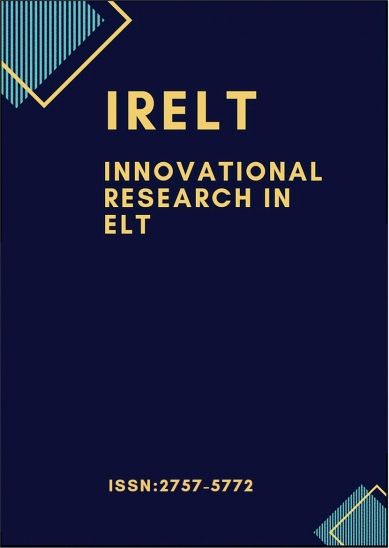Research article | Open Access
Innovational Research in ELT 2021, Vol. 2(1) 21-30
Turkish EFL Teachers' Awareness of Critical Pedagogy Implementation
pp. 21 - 30 | DOI: https://doi.org/10.29329/irelt.2020.347.3
Publish Date: June 07, 2021 | Single/Total View: 375/1.037 | Single/Total Download: 578/2.316
Abstract
The practice of critical pedagogy principles in EFL (English as a foreign language) classrooms in recent years has contributed a lot to the emergence of critical perspectives toward EFL instruction among the EFL teachers and this study has aimed to determine Turkish EFL teachers' awareness of critical pedagogy implementation in the classrooms in Turkey. The awareness levels of 103 teachers working in Turkey has been measured by an adapted version of 'Critical Language Pedagogy Questionnaire' which was developed and validated by Mahmoodarabi and Khodabakhsh (2015). The researcher has translated and adapted the questionnaire into Turkish, calculated the internal reliability of it using Cronbach's alpha coefficiency, and found it as a reliable instrument (17 items; α = .91). The factor analysis of the adapted version has also been conducted and three-factor solution has been recommended for the questionnaire. The findings of the study have revealed that Turkish EFL teachers are to some extent aware of how critical pedagogy principles can be implemented in EFL classrooms in Turkey. Also, a statistically significant difference between the participants holding MA degrees and BA degrees has been found when a series of Mann-Whitney U tests has been conducted for each sub-scale. On the other hand, no significant difference has been found between the self-reported scores of males and females according to the Mann-Whitney U test results.
Keywords: EFL, critical pedagogy, awareness, graduation degree
APA 7th edition
Kircali, M. (2021). Turkish EFL Teachers’ Awareness of Critical Pedagogy Implementation. Innovational Research in ELT, 2(1), 21-30. https://doi.org/10.29329/irelt.2020.347.3
Harvard
Kircali, M. (2021). Turkish EFL Teachers’ Awareness of Critical Pedagogy Implementation. Innovational Research in ELT, 2(1), pp. 21-30.
Chicago 16th edition
Kircali, Melih (2021). "Turkish EFL Teachers’ Awareness of Critical Pedagogy Implementation". Innovational Research in ELT 2 (1):21-30. https://doi.org/10.29329/irelt.2020.347.3
Aliakbari, M., & Allahmoradi, N. (2012). On Iranian school teachers' perceptions of theprinciples of critical pedagogy. International Journal of Critical Pedagogy, 4(1),154-171.
Aliakbari, M., & Amoli, F. (2014). Teachers’ awareness of critical pedagogy: A case
study ofIranian EFL teachers. European Online Journal of Natural and Social Sciences, 3, 128-134.
Atai, M., & Moradi, H. (2016). Critical pedagogy in the context of Iran: Exploring
Englishteachers’ perceptions. Applied Research on English Language, 5(2), 121-144.
Beck, A. (2005). A place for critical literacy. Journal of Adolescent and Adult
Literacy, 48(5), 392-400.
Behrouzi, Y. (2018). The relationship between teachers’ and learners’ gender and their
view on principles of critical pedagogy. Journal of Education and Practice, 9, 64-71.
Brewerton, P., & Millward, L. (2001). Organizational research methods. London:
SAGEpublication.
Etikan, İ., Musa, S. A., & Alkassim, R. S. (2016). Comparison of convenience sampling
and purposive sampling. American Journal of Theoretical and Applied Statistics, 5(1), 1-4.
Fowler, F. J. (2009). Survey research methods (4th ed.). Thousand Oaks, CA: Sage.
Freire, P. (1993). Pedagogy of the oppressed: Revised twentieth Anniversary Edition.
New York: Continuum.
Hofstede, G. (1980). Culture’s consequences: International differences in work-related
values. Newbury Park, CA: SAGE.
Jeyaraj, J. J., & Harland, T., (2019). Linking critical pedagogy practice to higher
education in Malaysia: insights from English language teachers. Asia Pacific Journal of Education, DOI: 10.1080/02188791.2019.1572590
Kaçar, I. G., & Zengin, B. (2013). Perceptions of pre-service teachers of English
towardsgrammar teaching in the Turkish context. The Journal of Language and Linguistic Studies, 8(3), 50-80.
Kirkgoz, Y. (2007). English Language Teaching in Turkey: Policy Changes and their
Implementations. Relc Journal, 38, 216-228.
Kumararavadivelu, B. (2003). Beyond methods: Macro strategies for language
teaching.New Heaven, CT: Yale University press.
López-Gopar, M. E. (2019). Introducing international critical pedagogies in ELT. In M.
E. López-Gopar (Ed.). International perspectives on critical pedagogies in ELT
(pp. 1-15). Cham, Switzerland: Palgrave Macmillan.
Mahmoodarabi, M., & Khodabakhsh, M. (2015). Critical Pedagogy: EFL teachers’
views, experience and academic degrees. English Language Teaching, 8, 100-110.
Norton, B., & Toohey, K. (2004). Critical pedagogies and language learning: An
introduction.In B. Norton, & K. Toohey (Eds.), Critical pedagogies and language learning (pp. 1-18). Cambridge: Cambridge University Press.
Ordem, E., & Ulum, Ö. (2019). Critical pedagogy and participatory approach in Turkey:
views of pre-service ELT teachers. Journal ofTurkish Studies, 14, 679-693.
Ordem, E., & Yükselir, C. (2017).Views of Turkish EFL instructors on Critical
pedagogy.Journal of Turkish Studies, 12(14), 285-294.
Riasati, M. J., & Mollaei, F. (2012). Critical pedagogy and language learning.
International Journal of Humanities and Social Science, 2(21), 223-229.
Sarvestani, N., & Yamini, M. (2016). Iranian EFL Teachers’ attitudes towards Critical 7
Pedagogy. International Journal of English Linguistics, 6(1).
Shang, R., & Troudi, S. (2020). Critical english foreign language teacher education in
China. Journal of Advances in Education Research, 5(2), 92-104.
Tavakol, M., & Dennick, R. (2011). Making sense of Cronbach’s alpha. International
Journal of Medical Education, 2, 53-55.
Werner, O., & Campbell, D.T. (1970). Translating, working through interpreters, and
the problem of decentering. In: Naroll, R. and Cohen, R., (Eds.), A Handbook of Methodin Cultural Anthropology, American Museum of Natural History, New York, 398-420.
Yilmaz, K. (2009). Elementary school teachers’ views about the critical pedagogy. The
Asia-Pacific Education Researcher, 18(1), 139-149.
Yılmaz, K., & Altınkurt, Y. (2011). Prospective teachers’ views about critical pedagogy.
Ahi Evran Üniversitesi Eğitim Fakültesi Dergisi, 12(3), 195-213.
